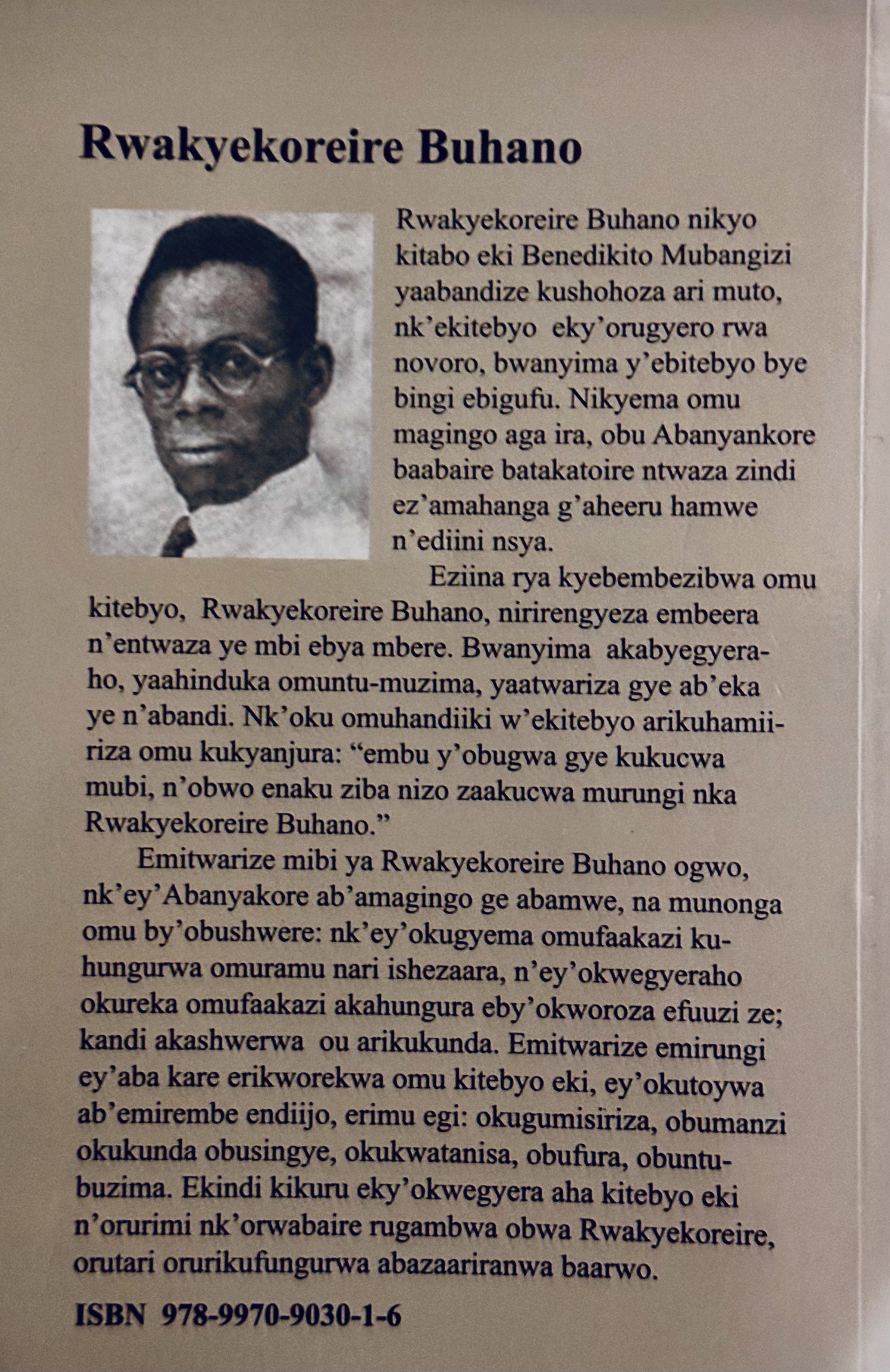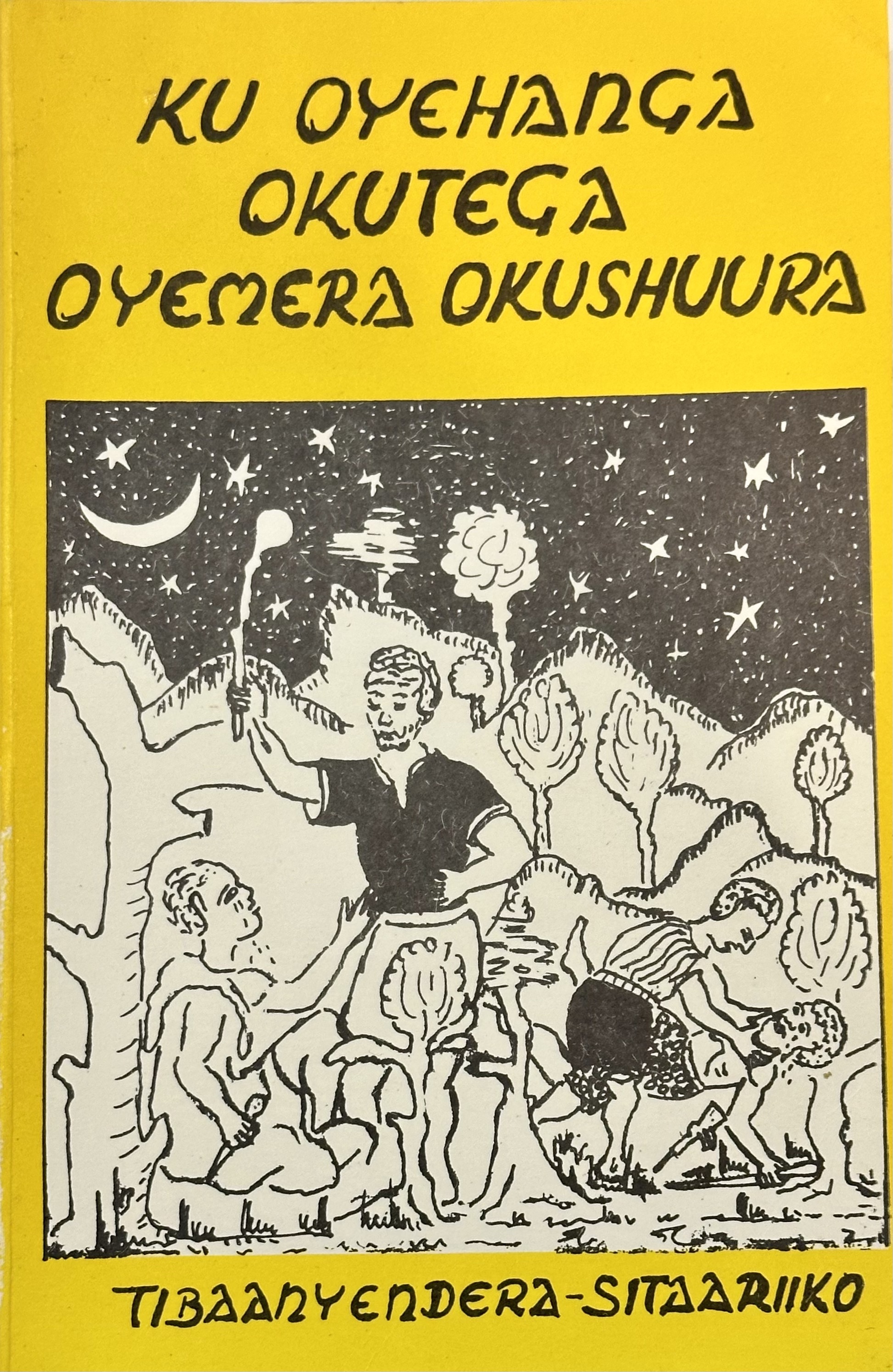I love a good story, told the way my grandmothers and other elders held me captive on many unforgettable evenings during my childhood. Those stories, narrated in Orukiga, my mother-language, were laced with idioms, proverbs, songs and sounds that would quickly transport me to a world I knew but didn’t know, one I feared but longed to experience.
The post-dinner atmosphere in which the stories were told added to their power. Well-timed sparks from ekikoomi (outdoors fireplace) or aha mahega g’ekiyungu (kitchen cooking place) would startle us as though on cue to coincide with a scary or other dramatic moment. A blues singer in a nearby valley, under the influence of omuramba (a potent sorghum beverage), probably struggling to stay straight and to persuade the left foot to alternate with the right, would hit a high note as the storyteller took us into the dark corner where abakyekyezi (night dancers) lay in wait.
Not even a starry sky or full moon would ease the rising tension as the storyteller quickened the pace towards the conclusion, complete with imitation of the terrifying sounds of the medicine man or of the wild animal that had evaded the hunters throughout the tale.
Nobody told the stories better than Rwendinga Tibihika mwene Mununuura, tatento (my uncle) in Kahondo ka Byamarembo, whose baritone was the perfect voice for the role. His facial expressions, his laughter, his wordless emphases, and punctuation of the narration with glorious sounds of enanga (zither), would turn the story into a description of evident reality.
A drum, sounded unexpectedly, would quicken my heart, and induce a momentary desire to flee. Of course, I would stay, utterly transfixed by Tatento Tibihika in full flight as he described the exploits of the great warriors and hunters of my people, Abakonjo b’Abatenga ba Nyanga ya Kahondo ka Byamarembo. Tibihika was the undisputed chief griot in my world, his stories guaranteed to leave me hungry for more.
There were two other story tellers in Kahondo, whose memories endure, not because of their tales, but because of their appearance that added power and magic to the narration. Well into the late 1960s, Katokoozi, a famous traditional medicine woman, exclusively dressed like her ancestors had done. Ebishaato or enkanda (tanned goatskin skirts) and empu (leather shoulder throws), accessorized with multi-coloured beads, were her trademark. Emiringa (metal bangles on her arms) and enyerere (metal anklets) announced the presence of a confident woman, truly one of the last culturally unpolluted Abakiga.
Bacondo Omureingwa wa Nyamitooma Ishe Kateete, my great uncle, was a man of regal bearing. Tall, strong boned and with a voice that added power to his measured speech, he was among the last men I saw wearing pure leather clothing, enhanced by metal bracelets and anklets that gave me a glimpse into what my ancestors might have looked like.
Katokoozi and Bacondo gave one the impression that they had been present during the exploits of our earlier ancestors like Byamarembo, Nyakashaija, Ruhuuma, Ndahuka and Rubagumya, about whom many stories were told.
By the time I entered high school, I had already been uprooted from my traditional living and experiences. My contact with my elders in Kahondo had almost come to an end, what with boarding school and the attractions of urban lights and imported entertainment.
My transition into a pseudo-European included introduction to the works of British writers. I enjoyed these and other European writers, but never related to the traditions and milieu in which their stories were set.
In recent years, I have re-read many of these European works of my youth, thoroughly enjoyed them and finally understood them because I have lived among the tribes of Europe and North America. However, my literary passion has remained firmly anchored in Africa.
My top three favourite works of fiction are “God’s Bits of Wood” by Ousmane Sembene, “Things Fall Apart” by Chinua Achebe and “Heart of Darkness” by Joseph Conrad, in that order. I have re-read them several times and look forward to enjoying them again. Whereas these three novels rightfully enjoy a cult status among African bibliophiles, they are a small fraction of the large canon of African fiction that has given me pleasure and priceless tutorials about life.
I have now shifted interest to the fictional works of writers in Rukiga-Runyankore, my mother language, with the hope of reliving the experience of listening to my elders in Kahondo and Mparo. The two that I have read, so far, have been so captivating that I am now on a hunt for more.
The first was “Rwakyekoreire Buhano” by Benedikito K. Mubangizi. Published in 2019 by University of Saint Joseph Mbarara Press, this novel, the first by Mubangizi, was written in 1971. Originally published as a two-book series, this edition is the first presentation of the full story of the life of a man called Rwakyekoreire Buhano.

The story is set in the pre-colonial period, in the area that was to become known as Ankole. Rwakyekoreire, the son of Rwakyahinda, a member of Abairuntu clan, lived in Ibaare, near Kitabi, in Igara. He was an angry, impatient, and aggressive young man, forever fighting whoever irritated him.
This is the story of Rwakyekoreire’s youth, adulthood, and old age. It is a suspense-filled story with twists and turns, written in beautiful classic Runyankore that one no longer hears in conversation. Check this out: “Ku agamba ebyo, omukazi ayongyera arira, amaizi gati fukufuku. Bombi baza aho omu katunguutano, ebiteekateeko byabo biza omu mwirima gwa ndindindi; bagira bati curiii!”
Modern readers need not worry that they will not understand Mubangizi’s lyrical language. In his words: “Orurimi rw’eki kitebyo rutakukanga ahabw’okushangwa rugumire ruri orw’omurembe gwa Rwakyekoreire, orwabaire rutakafungukire n’okugiibwamu ebitobe nk’orwa Yakobo Bindeeba orw’ekitebyo kyangye ekindi, eky’Abagyenda Bareeba.” (Do not be scared by the undiluted language of this story, which has not been polluted with borrowed words.)
The other excellent novel, written in more modern Runyankore complete with vernacularized English words, is “Ku Oyehanga Okutega Oyemera Okushuura” by Sitaariiko Tibaanyendera. Published by Marianum Press, Kisubi, in 1983, this is a crime thriller set in Mburara and Rwampara in 1964. This is masterful storytelling that uses suspense and tension to keep one guessing and eager to get to the last page. It should be made into a movie.

These two stories would probably not have had the same impact had they been written in English. I am eager to see recommendations for more novels written in Rukiga-Runyankore, Runyoro-Rutooro and Luganda, these being the only African languages I can read and understand. To be sure, we need more writers to carry Mubangizi’s baton forward.
However, not even the finest pens of Mubangizi, Tibaanyendera, Chinua Achebe, Okot p’Bitek, Godfrey Kalimugogo, or Nansubuga Makumbi can measure up to the story telling that made my childhood a live theatre experience. Who will tell today’s children the stories of their ancestors?
© Muniini K. Mulera